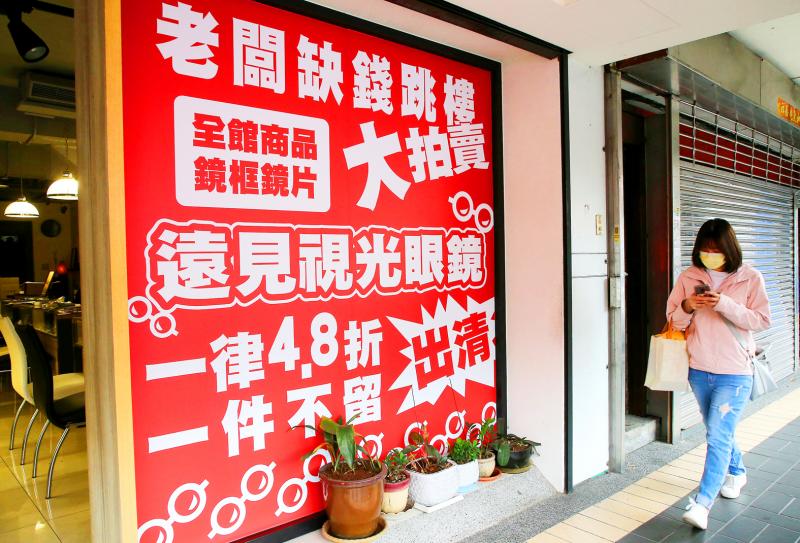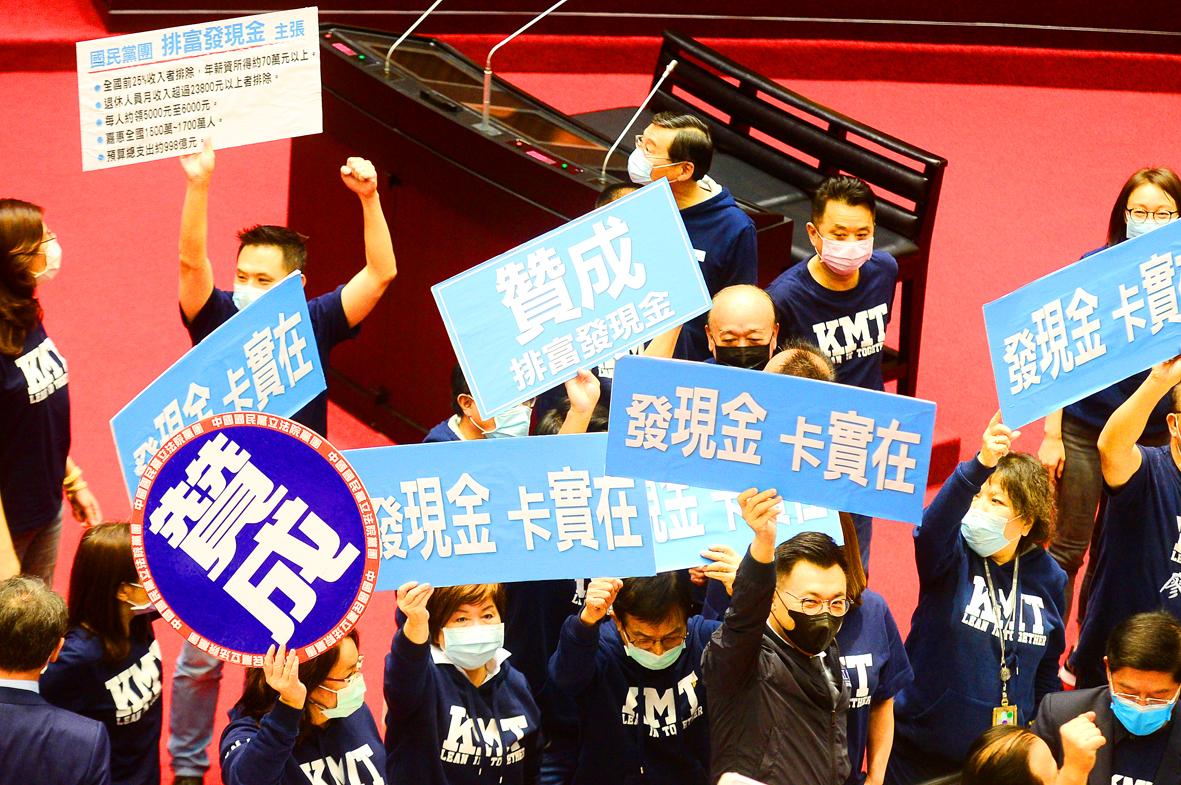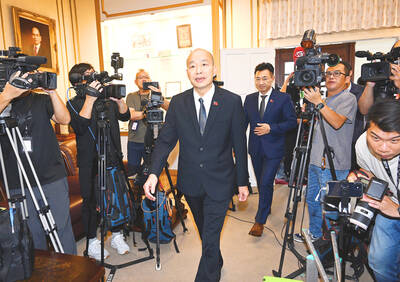Lawmakers yesterday passed an amendment to the Act on COVID-19 Prevention, Relief and Recovery (嚴重特殊傳染性肺炎防治及紓困振興特別條例), raising the upper limit of a special budget to bail out industries and people whose livelihoods have been affected by the pandemic to NT$210 billion (US$7 billion).
The new limit represents a NT$150 billion increase to the budget’s ceiling, NT$60 billion, passed last month by the Legislative Yuan, and the amended act is to serve as the legal basis for a matching budget increase proposed this month by the Executive Yuan for its expanded economic stimulus package.
Depending on the development of the pandemic, a second special budget may be planned, but its amount must not exceed the current one, the amendment says.

Photo: CNA
The planning and spending of the accompanying special budget, for which the Executive Yuan is soon to submit a request, would not be bound by limitations in the Budget Act (預算法), it says, meaning that funds allocated to one agency can be redistributed to another.
Exceptions are special budgetary items that have been annulled by the legislature, it adds.
The budget is to be sourced from surplus revenue from previous fiscal years and borrowing, which is not subject to rules in the Public Debt Act (公共債務法) that limit the amount of capital the government can borrow for the special budget in a fiscal year to 15 percent of the proportion used, the amendment says.

Photo: Wang Yi-sung, Taipei Times
Two proposals tendered by the Chinese Nationalist Party (KMT) caucus — to waive or reduce business tax for operators in sectors significantly affected by the pandemic and waive their import duties — were vetoed.
At the start of the legislative plenary session, KMT Legislator Chiang Wan-an (蔣萬安) criticized the Executive Yuan’s policy for bailing out self-employed workers and freelancers, saying that requirements such as having participated in the Labor Insurance Fund and having an insured monthly salary of less than NT$24,000 to be eligible for a NT$30,000 subsidy are too strict.
He also criticized the Cabinet’s reluctance to issue cash handouts to people subject to an income tax rate of up to 20 percent, saying that what Taiwanese need now is a timely subsidy to help them through the pandemic, citing countries such as the US, the UK and Malaysia, which are giving citizens cash handouts.
However, the KMT caucus did not tender the proposal mentioned by Chiang.
Democratic Progressive Party Legislator Wu Ping-jui (吳秉叡) said that the KMT proposal would have given even people earning an annual salary of NT$2.42 million a subsidy of NT$6,000.
Even lawmakers, whose annual salary is more than NT$2 million and who have no need for subsidies, would have received NT$6,000 under the KMT’s initial proposal, he said.
The KMT is trying to score political points with the proposal, but that would only encroach on the budget allocated for people who most need it; for example, taxi drivers, whose business has been seriously affected by the pandemic, he added.

NON-NEGOTIABLE: The US president’s action ran counter to one of the US’ ‘six assurances’ on not consulting China about arms sales to Taiwan, US lawmakers said US President Donald Trump’s admission that he is discussing arms sales to Taiwan with Chinese President Xi Jinping (習近平) is “alarming and a blatant violation of US policy and the six assurances,” US Representative Ro Khanna said on Tuesday. Trump on Monday said he would decide soon on whether to send more weapons to Taiwan, after Xi warned him not to do so. “I’m talking to him about it. We had a good conversation, and we’ll make a determination pretty soon,” Trump told reporters aboard Air Force One when asked about warnings raised by Beijing during a phone call with Xi over

VACILLATING? Some US officials are concerned that Trump’s April visit to Beijing might be affected if Washington pushes through additional weapons sales to Taiwan A major US arms sales package for Taiwan is in limbo following pressure from Chinese President Xi Jinping (習近平) and concerns among some US officials that greenlighting the deal would derail US President Donald Trump’s upcoming visit to Bejing, the Wall Street Journal (WSJ) reported on Wednesday. Trump on Monday said that he would decide soon on whether to send more weapons to Taiwan, after Xi warned him not to do so. “I’m talking to him about it. We had a good conversation, and we’ll make a determination pretty soon,” Trump told reporters aboard Air Force One when asked about warnings raised

OPTIMISTIC: The DGBAS sharply upgraded its GDP growth estimate from 3.54 percent to 7.71 percent after the Taiwan-US trade agreement signing and given AI optimism The US imported more from Taiwan than China for the first time in decades, as US President Donald Trump’s tariffs reshape trade flows while a global boom in artificial intelligence (AI) fuels demand for tech products. US purchases of goods from China plunged almost 44 percent in December last year from 2024 to US$21.1 billion, US Department of Commerce data showed on Thursday. By contrast, shipments from Taiwan more than doubled during the same period to US$24.7 billion. The soaring Taiwanese shipments to the US reflect the huge expansion in supplies of chips and servers for AI companies, which has completely changed

TEAMWORK: All parties should prioritize national defense and key security issues, which requires cooperation and long-term, stable support, the DPP’s Chen Pei-yu said A proposed NT$1.25 trillion (US$39.66 billion) special defense budget would be a top priority for the Legislative Yuan when it reconvenes after the Lunar New Year holiday, Legislative Speaker Han Kuo-yu (韓國瑜) said yesterday after a group of 37 US lawmakers sent letters to Taiwanese politicians expressing concern over the stalled budget. Chinese Nationalist Party (KMT) members Han and Deputy Legislative Speaker Johnny Chiang (江啟臣) in a statement said they would help party caucuses deliberate about the special defense budget, adding that they value open, candid and sincere exchanges with the US Congress and take US lawmakers’ concerns seriously. Taiwan-US relations are